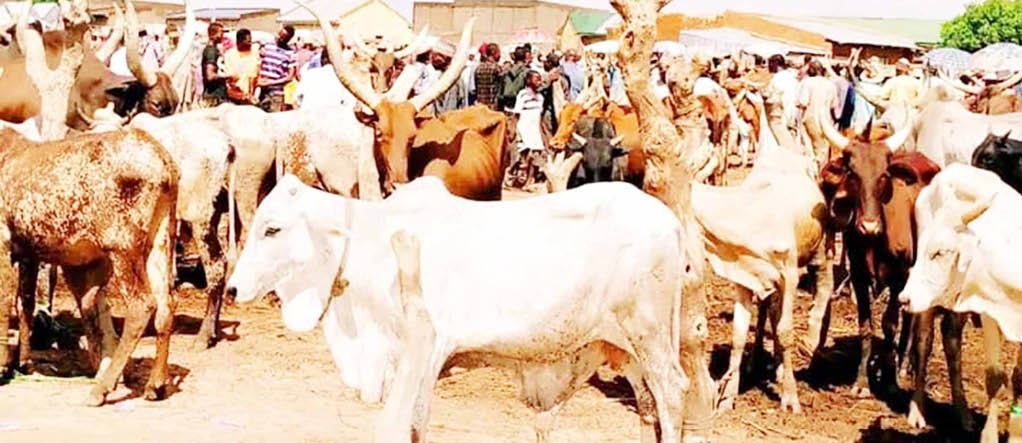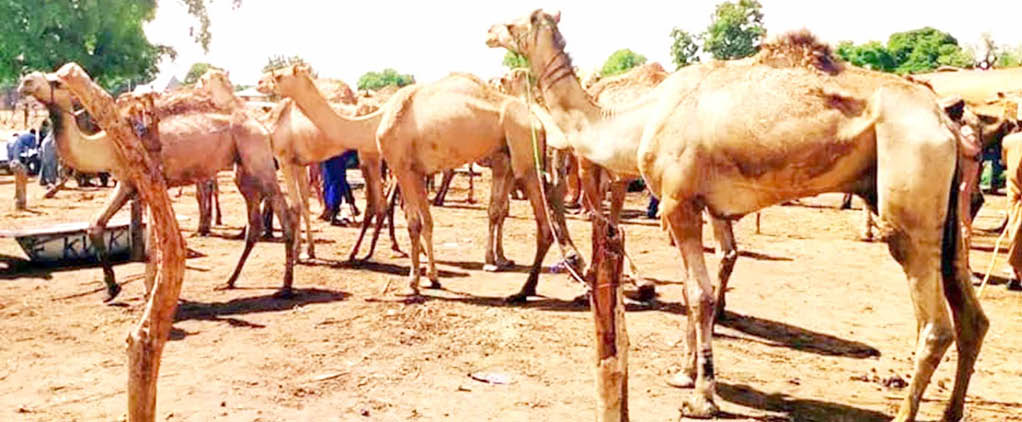It’s no longer news that the Boko Haram insurgency has displaced many people from their lands. This has led to a decrease in food supply in the affected states in the North East.
But of recent, farming activities and livestock business have started picking up, with traders from different parts of the country coming to Yobe State to buy foodstuffs and livestock.
In an interview with traders in Potiskum, Geidam, and Damaturu LGAs of the state, it was learnt that despite the security challenges, business and farming activities are still doing well in some parts of the state.
Lamido Damina Yarima, Sarkin Tirken Potiskum, told Daily Trust on Sunday that before the advent of Boko Haram, more than 50 trailers of livestock were being exported weekly from the Potiskum Livestock Market to some parts of the country, but that now the market exported less than 40 animals weekly.
- France deploying forces, war equipment in preparation to invade Niger – Junta
- NSCDC trains 900 personnel on schools’ protection
He said, ‘‘Before this disaster (Boko Haram), people were coming to this market weekly, specifically on Wednesdays and Thursdays, to buy goods and transport them to other parts of the country and some neighbouring countries.
‘‘People buy several varieties of animals in this market for crossbreeding, from goats, cows, horses, sheep to camels, but things have changed now. Those that used to bring such animals are terrified; they are no longer coming to the market.
“Despite that, we are not doing badly, livestock and raw foods are coming to the market weekly, but not like before; that is the real matter.’’

Commenting on the issue, the Chairman of the Potiskum Butchers Association, Alhaji Ibrahim Yunusa (Mali), said around 2005 and 2008, over 80 to 50 cows were being slaughtered daily in Potiskum alone, but that now less than 20 of them were being slaughtered daily as a result of the insurgents that had displaced and forced people to excessive poverty.
He said, ‘‘In previous times, we used to slaughter 80 to 70 cows daily, if we slaughter 50 cows, that day is bad for us, even I alone used to slaughter five to six cows daily, but after the disaster, all combined have dropped to less than 20 cows daily.
‘‘Many people have lost their capital to the insurgents because the predicament has not allowed us to go to the market to do business.
‘‘Many of us use our capital to feed our families. Then we moved to selling our assets.
‘‘When we go to the market, there are no business activities; people are just hanging around, some are even expecting that they might not return home alive; this situation has destroyed our earnings.
‘‘Although Boko Haram has gone and business activities have started coming back as some people are doing their businesses, but the situation is not like what it was before the disaster. Before this insurgence, I had more than N100 million as my capital which I used to do the business, but now what I have is less than what you can predict.’’
Daily Trust on Sunday gathered that despite the insurgency, farmers are still planting and harvesting crops like maize, rice, beans, sorghum and sesame in the state.
Meanwhile, farmers have lamented that the decision made by the Nigerian Army to stop the supply of fertilisers to Yobe State to stop the production of Improvised Explosive Devices (IEDs) by terrorists had affected crop production in the state.
A farmer, Yusuf Ibrahim Biriri, told this newspaper that 95 per cent of Yobe indigenes who were farmers and affected by the insurgency had been deprived of buying fertilisers.
He said, “Also, access to farms is another challenge. Many areas are not secured for farmers to cultivate their crops, and they cannot take their crops to the market because of fear of attacks. So, these reasons are obvious, and they can greatly affect production in Yobe State.
‘‘However, despite this restriction, as you can see, people are bringing their harvested crop to the market daily and they are happy with the prices.
‘‘Despite these challenges, Yobe remains the centre of sesame farming in Nigeria as no state is producing sesame like the state.’’
Another farmer, Yawale Ali, told Daily Trust correspondent that urea fertiliser was very important in farming activities, hence that banning it by the security agencies for being used for the production of IEDs had affected rice production in the state.
‘‘Initially, the security agencies banned all fertilisers, but after so much consultation and consideration they agreed that NPK should be allowed. Although NPK is augmenting, it is not like urea, especially to us rice farmers.
‘‘So, these restrictions have greatly affected production in Yobe, but notwithstanding, people are doing well in the state, especially our teeming youths.’’
As some business activities are going slowly in the Potiskum Livestock Market, Daily Trust on Sunday learnt that business activities are also booming in Kuka-Reta market even more than in previous times before the arrival of the insurgents.
Livestock from Chad, Cameroon and Niger are imported to the market every Tuesday, unlike previous times.
A livestock seller in the market, Mallam Bana Aramma, said the market used to export cows and other animals to different parts of the world after they were brought in from the neighbouring countries.
He said, ‘‘Every week we transport 30 trailers of cows and bulls from Kura-Reta to Loba, Lagos, and Port Harcourt after we buy them from foreigners who come from Chadi, Cameroon and Niger.
‘‘The business activities are boosted in the market to the extent that even before Boko Haram such activities were not taking place here.’’
Speaking on the matter, Saleh Damniya, told Daily Trust on Sunday, ‘‘Many people are expressing views about boosting socio-economic activities in this market, but what I know in short is that there are livestock markets in Gamdu, Maino and Jakana as a result of Boko Haram attacks in Borno State. These markets are now in concert with Kura-Reta market, which makes it more popular than any market in Yobe State.
‘‘People used to bring their goods to sell them and take their money to their respective destinations without any security threat.
‘‘Because I am working in the cows and bulls section, I can assure you that over 50 trailers of cows are exported weekly from this market to some parts of this country.
‘‘Although I am not doing business with the goats and sheep section, even there you could understand that more than 20 trailers are carrying animals to other markets.”
When contacted, the Chairman of the Yobe State Butchers Association, Alhaji Usman Muhammad Yellow, said despite the economic situation and security challenges, at least 5,000 livestock were slaughtered daily in the state.
He said, “Although we have security challenges which are affecting our occupations, more than 4,000 to 5,000 livestock are slaughtered daily in Yobe State.
‘‘As a result of these security issues and inflation, a normal cow which we used to buy at the cost of N250,000 now goes for N600,000 or N700,000.
‘‘Bulls in previous times stood at a cost of N350,000 per one, but now it has skyrocketed to N1.5 million. So, such prices can be attributed to the security threat that forced many herders to come to Yobe or the economic reality.
‘‘When there is dumping of goods in the livestock market, the prices may drop. Therefore, the owners of livestock are no longer coming to Yobe like they used to do in previous times. This may greatly affect the prices of cows, bulls and other animals in the state.
‘‘Also, many butchers have lost their capital as a result of this issue of insurgents’ attacks. Some lost their lives. So many reasons could be attributed.’’

 Join Daily Trust WhatsApp Community For Quick Access To News and Happenings Around You.
Join Daily Trust WhatsApp Community For Quick Access To News and Happenings Around You.


